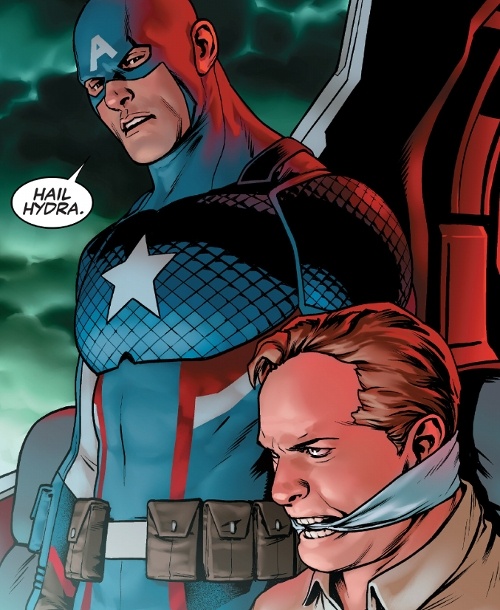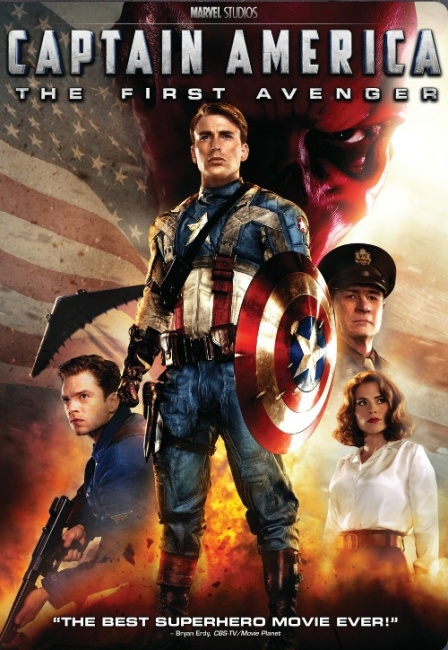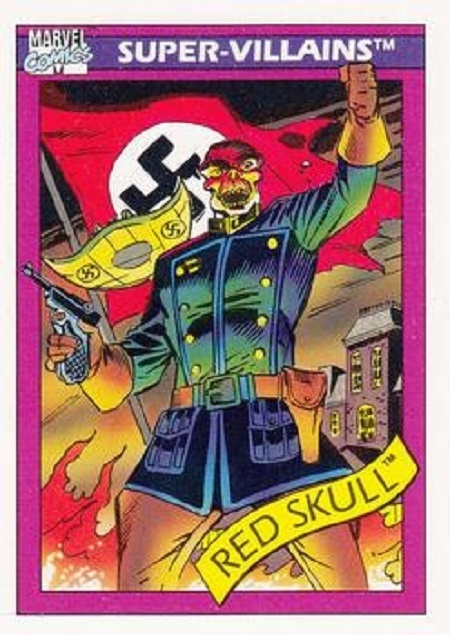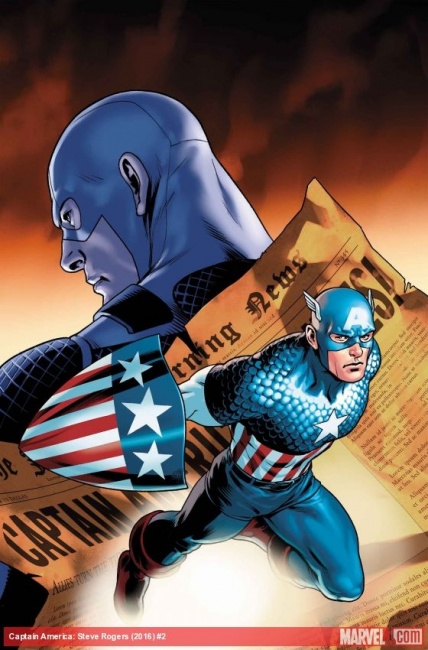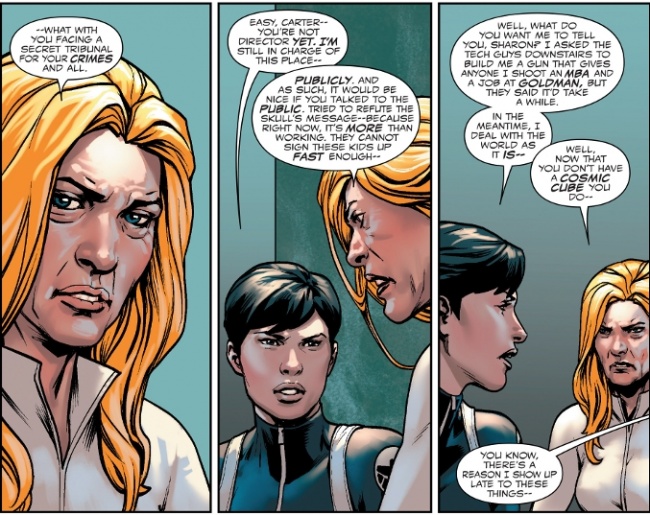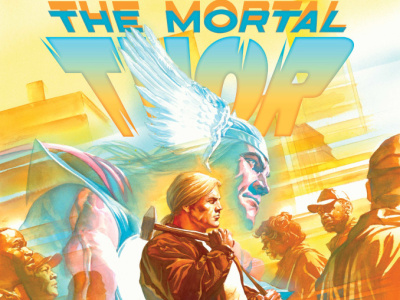Confessions of a Comic Book Guy is a weekly column by Steve Bennett of Super-Fly Comics and Games in Yellow Springs, Ohio. This week, Bennett takes another look at Captain America and the Nazis.
I know most of you have already moved onto the next "Worst Thing Ever," whatever that may be, but not surprisingly, I still have a few things to say about Captain America: Steve Rogers #1.
Last week Rob Salkowitz wrote a column (see "Captain America's Hydra Problem") about perhaps the most unfortunate, and ridiculous, part of the whole situation: Cap getting accused of being a Nazi. It made actual headlines, such as "Captain America A Nazi? An Insult to His Jewish Creators" and (on the Times of Israel no less) "Captain America is a secret Nazi, and people are going crazy about it." Not to mention "Just Kidding, Captain America a Nazi" by Mairead McArdle which appeared on the NewsBusters site. In its first paragraph of McArdle calls Cap "an undercover Nazi with Hydra."
The only trouble with all of these charges is they’re exclusively based on the 2011 film Captain America: The First Avenger, in which the character fought primarily not the Nazis but Hydra, WWII Germany’s "Science Division," which had its own agenda. That or they saw Avengers: Earth’s Mightiest Heroes, the animated series where WWII was apparently fought between America and Hydra. No reporter seemed to be aware that in the comics Hydra first appeared in 1965 and while it's admittedly led by former Nazi Baron Wolfgang von Strucker, Hydra was never a neo-nazi group. It wasn't even officially a fascist one, but rather your pretty much standard 60s-style bent-on-world-domination "international crime organization."
As to why Captain America, who was created specifically to fight the Nazis, didn’t fight any actual Nazis in his first movie, there are principally two reasons. In his column Salkowitz does a fine job of explaining the first one. Specifically, why Nazis were no longer the go-to villains in "comics and much of popular culture" they had once been: perhaps Nazis were considered too old and hackneyed to be relevant as villains anymore. Maybe it was suddenly considered in poor taste, after 50 years, to use the powerful imagery of the swastika and the very serious crimes of Nazis as fodder for entertainment, even in roles that acknowledged their heinous activities.
After directing the 1993 movie Schindler’s List, Steven Spielberg famously told the New York Times he could never "make another Indiana Jones where the Nazis are cartoon villains." And while I personally wouldn’t exactly call the Nazis in Raiders of the Lost Ark "cartoons," they didn’t exactly waiver far from the standard Hollywood stereotype of shouty foreigners with a distinctive fashion sense.
That other reason Cap fought Hydra? Money. A summer movie blockbuster has to appeal to the widest possible audience, which increasingly includes an international audience -- and Nazis are "problematic" in a lot of places. For instance, public displays of the swastika are banned in Germany, Hungary, Poland and Brazil; and in Buddhist countries it’s still considered a revered religious symbol. Fear of offense can also be a domestic issue; back in the 1990's a parent wrote Marvel to object to a swastika on a Red Skull trading card. Which led to a ban of using the swastika on all licensed products and, for at least a little while, they were also downplayed in Marvel Comics. I also seem to recall that this during this period there was a proposed animated Captain America series supposedly set during WWII that was swastika-free and didn't call the enemy Nazis.
The result of all this corporate caution, a problematic film,* mass confusion over Hydra and the Nazis, and Cap being falsely accused of being a Nazi. McArdle's piece actually contains some interesting quotes from Nick Spencer, the writer of the comic, and executive editor Tom Brevoort that reveal the expected; this kind of outrage was exactly what Marvel wanted. Spencer is quoted as saying, "The worst thing that could have happened today is people shrugging, or even being reasonable … this is what we wanted, we just have even more of it than we imagined." And Brevoort "admitted the twist was partially to 'see if you're paying attention and make readers long for the next issue.'"
Which brings me to what I thought about it. As a retailer, I can hardly complain about a juicy storyline that will (temporarily) spike sales and presumably generate at least a second and maybe even a third printing of #1. I even hold out the possibility it'll be a good story as there’s plenty of "torn from today's headlines" potential in it. Or as Brevoort himself put it, "We're currently in the middle of this very contentious presidential primary season where folks across America are feeling divided on a number of issues, this feels very much, at least to me, like it's of the zeitgeist of the moment."
And as a longtime fan I remain un-enraged. Frankly, I think I’m more unhappy with the idea of Archie having sex with Miss Grundy in the CW Riverdale pilot than I am about Steve Rogers having always been a Hydra agent. I know the change is only temporary and contrary to all assurances otherwise it will be fairly easy to restore the status quo. The only question being when that will happen. Hopefully it won’t overstay its welcome because historically fans aren’t all that interested in a "dark Cap." I’m sure you all recall how back in the late 80s it seemed like every major superhero had their own shadowy Jungian "other," an ancillary stand-in who could expand the hero’s brand by demonstrating the tougher attitude that the times seemed to demand. And while both Venom and War Machine are still out there making a profit for the company, it’s been quite a while since anyone has seen, or wanted to see, U.S. Agent.
Generally, speaking, I liked Captain America: Steve Rogers #1 well enough, though it probably says a lot about what kind of fan I am that I found the whole "twist" to be the least interesting thing about it. Much more of interest, to me anyway, is the fact that Rick Jones is once again Cap’s sidekick. And though the comic gives us no idea why, Cap’s long-time love interest Sharon Carter is now considerably older and is far less attractive. A friend informs me that her new look is due to the verisimilitudes of having spent a couple of decades trapped in Dimension X. I’ve got to admit I’m intrigued by the idea of your standard alpha male superhero having a relationship with someone who looks like one of your mom’s friends. I just hope we get a chance to see it play out in future issues.
* Along with making the first WWII movie that wasn’t anti-Nazi, anti-fascist, and only ever so slightly pro-America (international theaters were given the option to drop the "Captain America" portion of Captain America: The First Avenger; only Korea, Ukraine and Russia did so), it falsely pretends that the US Armed Forces were racially integrated in WWII (see "Confessions of a Comic Book Guy--Facing The Way Things Were").
The opinions expressed in this column are solely those of the writer, and do not necessarily reflect the views of the editorial staff of ICv2.com.
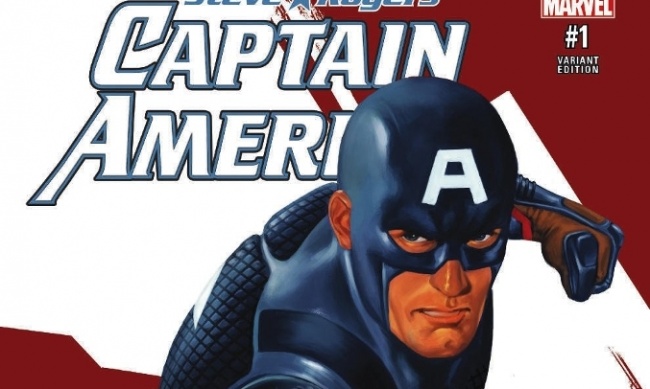
Column by Steve Bennett
Posted by Steve Bennett on June 8, 2016 @ 4:20 am CT
MORE COMICS
From Marvel Comics
July 3, 2025
Check out the first three covers of the new series, which sees the God of Thunder reborn as a mortal.
RMH Through Reseller, Pull List Add-On or Full POS
July 3, 2025
Several paths forward are available, including maintaining RMH with an integrated pull-list program, or alternate POS systems.
MORE COLUMNS
Column by Rob Salkowitz
June 30, 2025
Columnist Rob Salkowitz talks to a mid-sized publisher who told him we are at "DEFCON 2, if not DEFCON1."
Column by Scott Thorne
June 30, 2025
This week, columnist Scott Thorne discusses sales on the Final Fantasy set and his experience with Games Workshop's policies on breaking release dates.



